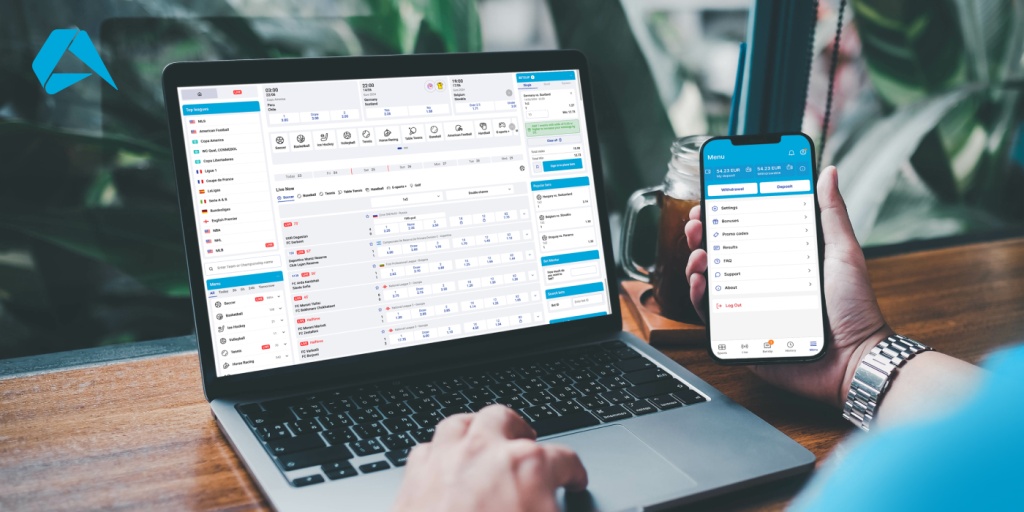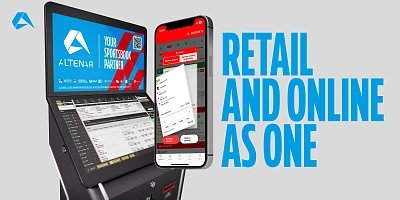Choosing the right platforms to offer iGaming entertainment that best aligns with strategic goals will bolster revenue, increase player acquisition rates, and contribute to the brand's overall success.
Let’s examine all options more closely, look at the markets they are most suitable for, and consider the benefits and drawbacks of each.
Arguments for Betting Site Only
It is not uncommon for iGaming operators to grapple with decisions on how to best allocate resources. From a strategic perspective, focusing on developing a comprehensive sports betting site, to the exclusion of a mobile app, can offer several distinct advantages:
The Advantages of a Website-only Approach
1. Cost Efficiency
Developing and maintaining a sports betting website alone is considerably less costly than a dual approach. Development can include separate designs and functionalities for multiple platforms. It will also incur ongoing operational expenses such as app updates, testing across different devices, and compliance with app store regulations. By concentrating on a website alone, operators can better appropriate their budget to free up investment in essential areas like marketing, customer service and security.
2. Browser Accessibility
Unlike mobile apps, a well-optimised sports betting website can be accessed from any device with a web browser, offering a universal platform without the need for downloads or app-specific adjustments. With broader accessibility, iGaming operators can reach larger audiences, particularly in regions where installing apps might be restricted or where consumers may not have devices compatible with the latest app versions.
The website-only approach ensures that anyone with internet access can engage with the betting platform and removes the need to download and carry an additional app, thus maximising potential user engagement.
3. Simplified Regulatory Compliance
Operating a sports betting website can simplify regulatory compliance. Mobile apps often face burdensome regulations that vary significantly across app stores and jurisdictions. Moreover, each update or modification can require re-submission for approval, leading to potential downtime and delays in getting updates to users. Websites, however, can be updated universally and immediately without needing such approvals.
4. Ease of Integration
In addition to easier and faster updates, integration with third-party services and tools can be more straightforward on a web-based platform, enhancing the site’s capabilities and allowing for quick adoption of new technologies and trends.
5. Enhanced Performance and Scalability
Concentrating on a single platform helps optimise platform performance, such as load speeds and interface responsiveness. Furthermore, websites can be scaled more readily to handle increased traffic, especially during major sporting events, without the bottlenecks that can throttle mobile apps with device-specific limitations. In turn, this aids customer retention and satisfaction.
6. SEO and Visibility
A strong web presence boosts search engine visibility and organic traffic, which could be more complex in app-centric ecosystems. SEO strategies can be more focused and employed strategically to enhance the visibility of a sports betting website, attracting new users through search engines.
The Drawbacks of a Website-only Approach
While there remain some compelling arguments for a website-only approach, it also carries some notable disadvantages.
For instance, it may alienate a tech-savvy demographic that prefers to access betting platforms via mobile apps due to their convenience and user-friendly interfaces. Mobile apps can also enhance user engagement through features like push notifications and location-based services. Features like this are not always easily integrated into websites.
Ultimately, the absence of a mobile app can place an operator at a competitive disadvantage since rivals offering both platforms cater to wider audience preferences, particularly in mobile-first regions.
Most Suitable For:
The website-only model is particularly suitable for iGaming operators focused on cost efficiency, broader accessibility and simplified regulatory compliance. It benefits operators who target regions with less prevalent mobile app usage and a more mature market and customer base.
Furthermore, this can be the optimal option for iGaming operators aiming to invest significantly in web-based marketing strategies for customer acquisition and retention.
Arguments for Stand-alone Mobile Apps Only
Stand-alone mobile betting apps offer several unique advantages for iGaming operators, too. The benefits increase user engagement by providing a smooth on-the-go betting experience that resonates with modern consumer preferences, particularly among younger demographics. Here are a few specific advantages of mobile betting apps in 2024:
The Advantages of a Mobile App-only Approach
1. Instant Feedback
Mobile sports betting apps provide online betting operators an excellent opportunity for instant feedback. This direct line to user insights, primarily through player reviews focused on the app's performance, acts like an ongoing debugging program. Operators can observe and analyse the feedback in real time. This helps identify technical issues or interface improvements and allows them to customise the in-app experience to meet player preferences.
2. Offline Access
One of the best arguments for mobile apps is their limited offline functionality. Users can access essential features such as reviewing past bets or checking account balances even without an internet connection. This encourages users to remain engaged with the app regardless of connectivity status.
3. Focused User Experience
Mobile apps are uniquely designed for on-the-go betting usage, providing a user-friendly interface that prioritises speed and accessibility. This is particularly advantageous in sports betting, where the ability to make quick decisions and place bets in real time can significantly influence betting volumes and outcomes.
4. Advanced Personalisation
Mobile apps excel at offering a customised betting experience by leveraging user data to adapt functionalities and content to individual needs. They analyse user behaviour to curate personalised betting options, notifications, and relevant updates. This level of customisation makes the betting experience more engaging, boosting retention rates to keep users consistently interested in app offerings.
5. Geolocation Services
Mobile apps incorporate geolocation services to enhance regulatory compliance and user experience. By using the device’s built-in GPS, these apps ensure that players can place bets within jurisdictions where betting is legal, which is essential for maintaining compliance. Ultimately, this feature protects both the user and the operator from potential legal consequences.
6. Push Notifications
Unlike websites, mobile apps can use push notifications to engage users directly with timely information. This feature is invaluable for informing bettors of last-minute betting lines, game starts, and promotional offers. The immediate delivery of such updates stimulates increased app interaction, leading to a higher number of bets placed and greater user retention.
7. Technological Integration
Mobile apps seamlessly integrate with the device’s inherent capabilities and other applications, enhancing both functionality and security. For instance, they can easily connect with payment gateways for smooth transactions and social media for social betting experiences. This integration results in a holistic user experience that ensures convenience and speed.
The Drawbacks to a Mobile-only Betting App Approach
While forward-thinking, adopting a mobile app-only strategy can also introduce challenges that could restrict an operator's reach and growth. First, operators risk alienating users who prefer a desktop computer's expansive views and stable interface. Furthermore, this limitation is compounded by requirements imposed by app stores, which can restrict content delivery and complicate the process of rolling out updates. The need for frequent updates to accommodate new operating systems and hardware will also invariably increase maintenance costs.
In terms of online presence, mobile apps lack visibility in search engine results, severely hindering organic user acquisition and potentially impacting the operator’s competitiveness in the broader marketplace.
Most Suitable For:
A stand-alone mobile app-only platform is most suitable for iGaming operators focused on a young, mobile-first demographic that prioritises convenience, speed, and personalisation in their gaming experience. This type of operator might be new to the market or looking to carve out a niche in urban, tech-savvy environments where mobile usage significantly outweighs desktop computing.
This approach significantly benefits agile operators targeting users who want fast on-the-go betting opportunities for live sports bets where timing is critical.
The Best of Both Worlds
Deploying both betting websites and mobile app platforms into your business strategy has some unique advantages. Here are several compelling reasons to employ a dual-platform approach:
The Advantages of a Dual Approach
1. Enhanced Competitiveness
Embracing a sports betting website and mobile betting app can significantly boost an iGaming operator's competitiveness in a saturated market. This dual-platform strategy allows entrepreneurs to offer a smooth and integrated betting experience that meets the needs of all preferences and situations. Significantly, this will make it more difficult for competitors to lure away users with more limited platform options.
Moreover, by continuously adapting across both platforms, operators are better positioned to leverage technical innovation and market trends in AI and data integration. This helps to establish a brand as a progressive and forward-thinking entity.
2. Reach and Accessibility
Employing both platforms ensures maximum accessibility for users. A website provides a stable, accessible point of entry for users on desktop computers, particularly favoured by older demographics or those in work environments.
Conversely, a mobile app offers on-the-go access, which is beneficial for capturing younger audiences who prefer using smartphones for the majority of their digital interactions. This dual approach allows operators to gain a larger market share.
3. Flexible User Experiences
Websites can offer a more comprehensive range of features and user interfaces suitable for in-depth interaction. On the other hand, mobile apps offer efficiency, convenience, and the ability to place bets swiftly on the go. This complementary functionality ensures that users receive a tailored betting experience, regardless of their device, location and personal situation.
4. Reduced Disruptions
By diversifying platform presence, sports betting operators reduce the risk of operational disruptions. If one platform goes down due to technical issues, the other can still function, providing continuous service to customers. This level of resilience strengthens brand reliability and trustworthiness, which is a significant factor in the highly competitive iGaming industry.
5. Optimised Marketing Capability
A dual approach allows marketing professionals to run parallel campaigns tailored to the distinct characteristics of each platform, such as push notifications for apps and SEO-driven content for websites. This broadens reach and strengthens engagement, thereby helping to increase conversion rates and retention.
6. Data Collection and User Insights
Operating both platforms provides comprehensive data collection opportunities across different user groups. The data can be used to gain insights into betting patterns, preferred functionalities, and areas for operational improvement. Such analytics are invaluable for targeted marketing strategies to drive higher satisfaction and loyalty.
The Drawbacks of a Dual Approach
As with all things, while a dual strategy has several advantages for ambitious iGaming operators, deployment also has drawbacks. Managing two platforms can significantly strain resources, as each requires attention to design, maintenance, function, security and updates. This duplication of effort typically results in higher operational costs.
Furthermore, ensuring a consistent user experience across platforms can be complex, potentially leading to discrepancies in service quality and user engagement. For smaller operators, these challenges divert focus from core business activities, operational requirements and marketing efforts, impacting growth within a competitive market.
Most Suitable For:
The dual approach of deploying both a website and mobile betting app is particularly suited to iGaming operators who aspire to maximise market coverage and enhance competitiveness across all customer demographics. This strategy is ideal for larger, more resource-rich operators who can manage the complexities and costs associated with maintaining multiple platforms. Such operators benefit from engaging both traditional desktop users and mobile-centric consumers to expand their reach.
Maximise Competitive Edge with Informed Choices
Here is a table highlighting how each strategy aligns with different operational goals and market segments.
Make informed choices to maximise your competitive edge and market presence.
| Strategy | Target Market | Pros | Cons | Suitable for |
|---|---|---|---|---|
| Website Only | Broad, focusing on a mature customer base. | Cost-efficient, universally accessible via browsers, simplified compliance, enhanced scalability. | May alienate mobile-preferred users, lacks app-specific engagement features. | Cost-conscious operators, markets with lower mobile penetration. |
| Mobile App Only | Younger, more tech-savvy, mobile-first users. | Instant feedback, offline access, personalised experience. | Limited to mobile users, higher maintenance costs, app store and search limitations. | Operators targeting quick, on-the-go betting experiences. |
| Combined Website and App | Encompasses all demographics. | Maximises reach and accessibility, flexible user experiences, operational resilience. | Higher operational costs and complex management of dual platforms. | Operators aiming for comprehensive market coverage and competitive advantage. |
Altenar, a leading sportsbook software provider, aims to help operators find the most profitable entry strategies into regulated markets no matter where they are in the world. Our white-label mobile app solution delivers BO tools for managing app features and is customisable to any brand without intensive development.
Contact our expert team at [email protected] today to learn how white-label betting apps can reduce the time and cost of publishing your branded platform.













